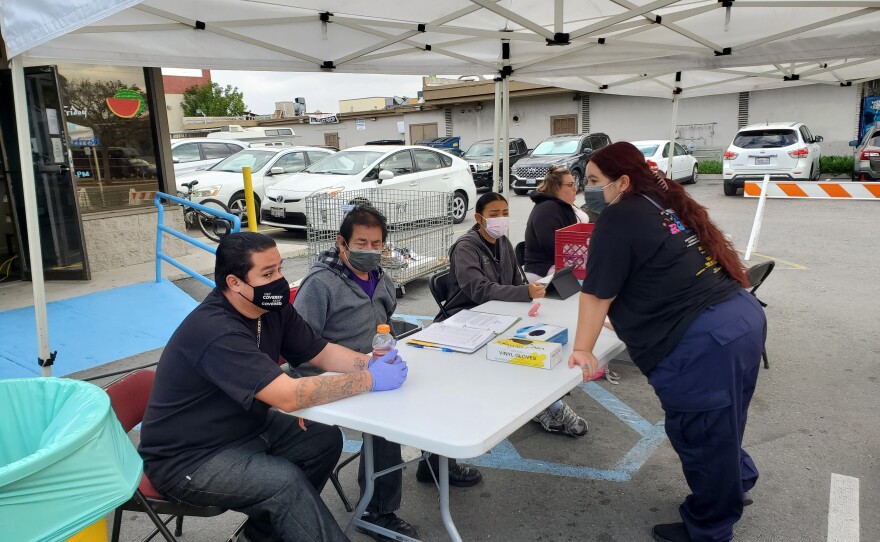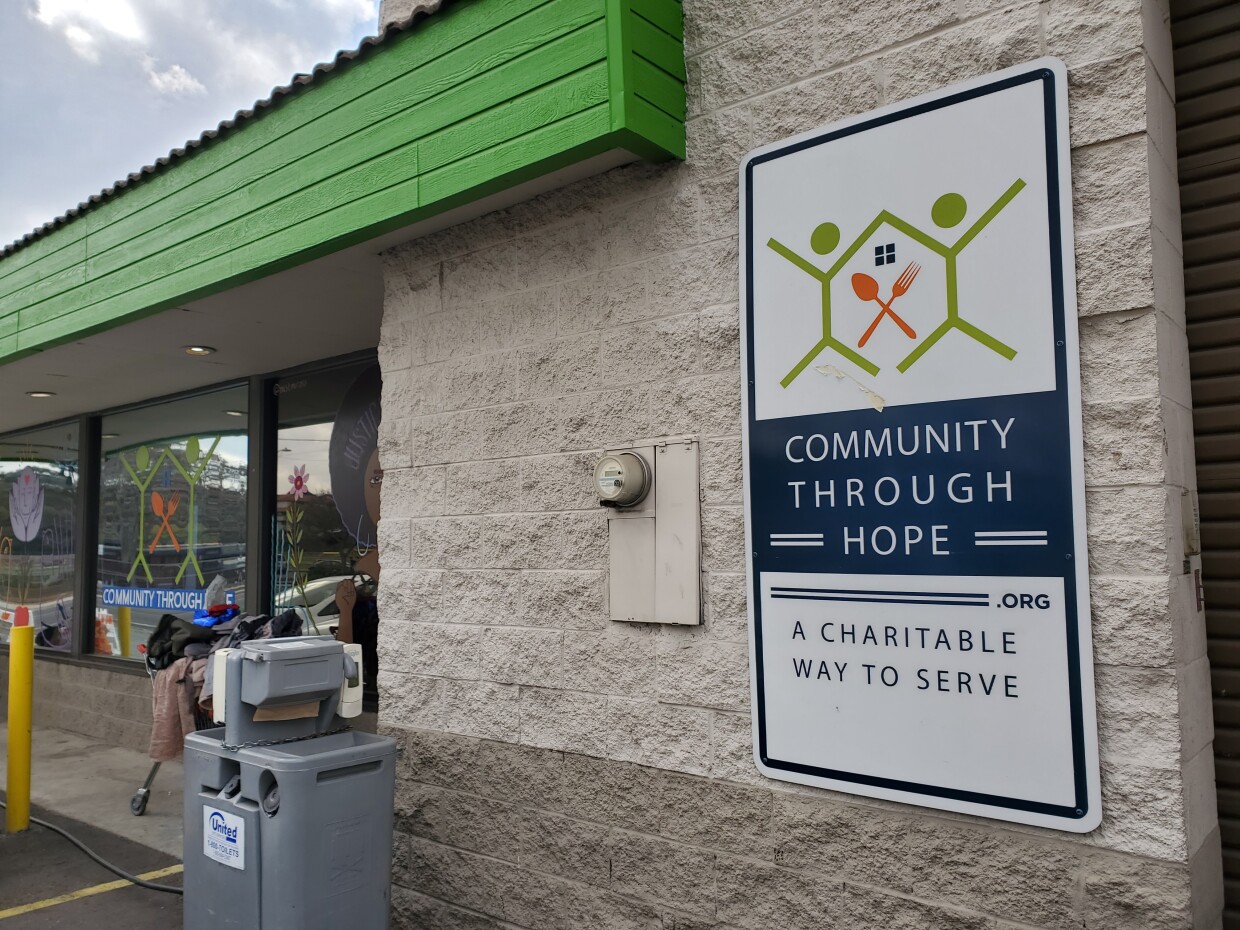In early 2018, Rose Vasquez was excited — and a bit anxious — to officially open her nonprofit Community Through Hope and begin giving out food and providing homeless services in Chula Vista.
She felt like she was ready and was thrilled when Chula Vista city officials promised she could sublease space from the local YMCA. But after months of emailing back and forth, they said she couldn’t use the YMCA space after all.
RELATED: Local leaders want big share of federal funds to fight port pollution
Finally, in November of 2018, Vasquez found a space on her own at an old warehouse on C Street. She was awarded a city contract that would help with the rent. But her issues with the city of Chula Vista were just beginning.
Over the next three years, she dealt with late payments, poor communication and the feeling that the city didn’t value the services provided by Community Through Hope. In 2021, the city opted not to renew its contract with the nonprofit and Vasquez vowed never to do business with Chula Vista again.
RELATED: Family support program First 5 First Steps enrolling 100 more families in South Bay region
“You're a value when they need you, and if you aren't going to do what they say, you are no longer of value,” she said. “There is no thought around the work that's being done by this organization and who is really going to suffer if that organization is not up and running. And in our case, it's literally community members on the street who rely on us every day.”
KPBS spoke with the leaders of several other nonprofits who provide services to homeless people, families with food insecurity and youth. They too tried to do business with the city in recent years and talked of similar experiences as Vasquez’s.
“You're a value when they need you, and if you aren't going to do what they say, you are no longer of value. There is no thought around the work that's being done by this organization and who is really going to suffer if that organization is not up and running. And in our case, it's literally community members on the street who rely on us every day to access nutrition, to access services.”Rose Vasquez, CEO of Community Through Hope
If a city has trouble working with nonprofits, it’s a problem for the entire community, said Laura Deitrick, the associate director of the Nonprofit Institute at the University of San Diego. Without good relationships with nonprofits, governments can't come close to meeting the needs of their constituents, she said.
“Especially in COVID, if you want to really look at how much government had to rely on nonprofits to reach populations to deliver all kinds of services, the nonprofit sector really stepped up,” she said. “It is an important relationship, a very important relationship that needs to be nurtured and invested in to the benefit of the community.”
Trust issues
The Nonprofit Institute and Luth Research recently did a survey of San Diego County residents that showed 79% of people trust nonprofits to provide quality services, compared to 55% of people who trust the government to do so.
Deitrick said the survey shows how important it is that “local governments have a real understanding that their constituents trust nonprofits.”
Chula Vista officials refused to be interviewed for this story. Instead, a spokeswoman sent written statements referencing some, but not all, of the issues raised by the nonprofit leaders.

Vasquez said problems began almost immediately after Community Through Hope signed its contract with the city. The city was late on payments, launched a surprise audit and asked her to share space with another nonprofit, she said.
“One of the things about the way that the city operates is that the paperwork or the details are unfortunately always a bit sketchy, but there's always someone from the city sort of doing that good faith push, ‘don't worry, just trust us, move in, it's going to get fixed,’” Vasquez said. “There's that side of it, and then there's what's actually happening in the details.”
For example, after the pandemic started, Community Through Hope saw a huge jump in demand for food donations, going from 5,000 people a month in February 2020 to almost 50,000 in April and May 2020, according to Vasquez. She asked the city for more money to help with the need.
“And each time we were told that our agency was not big enough, that dollars were being given to real agencies like South Bay Community Services,” she said.
Then, in the summer of 2020, when she saw an item on the City Council docket about allocations of CARES Act funding that read: “City intends to enter into an agreement with Community Through Hope, in an amount not to exceed $30,000, in order to provide food distribution.”
“I was very excited,” Vasquez said, thinking she would finally get additional funds. Turns out, the money wasn’t going to her organization, but to the police department to help manage traffic at Community Through Hope’s food distribution events.
“I never agreed to that, was not made aware of it, and we would have never known that anything was being done on our behalf had I not read the agenda for the City Council meeting,” she said.
In its statement to KPBS, the city said the $30,000 went to the police department because it spent more than $135,000 in one fiscal year on traffic control at Community Through Hope events, which were “creating significant traffic issues during COVID.”
Brick walls and bad faith
Ruben Torres leads the nonprofit Love Thy Neighbor, which provides arts programs to underserved youth. He too started with high hopes in his relationship with Chula Vista. But those hopes soon faded.
“It just seems like every time we did something we hit a brick wall,” he said.
Torres talks about 2019, when the city offered him a building to set up as a cultural arts center. But when the city’s cultural arts manager tried to show him the space, she couldn't get the keys.
“She said the Fire Department had the keys,” Torres said. “She said, ‘let me see what we can do, we'll meet up again next week.’ So we go back to meet up, and then she says, ‘it looks like the city is going to end up giving that building to the Fire Department.’”
“You just walk away kind of feeling like, 'well, should I even attempt to do anything else? Why even try?'”Ruben Torres, president of Love Thy Neighbor
Torres said city staff also told him he could set up a coffee cart business at local libraries as part of a job training program he does for youth. He went out and bought coffee cart equipment. But then the city went dark on him.
“Now we're left with a storage full of coffee equipment we spent thousands on,” he said. “There's some kind of disconnect or brick wall or something that happens in the internal structure of how things operate at the city of Chula Vista.”
In a statement, a city spokeswoman said discussions with Torres were preliminary.
“When the COVID-19 pandemic hit and all libraries in the City were shut down, the preliminary discussions did not continue,” the statement said. “The City is not aware of a request from Love Thy Neighbor to resume discussions regarding a coffee cart or a cultural arts center.”
Torres disputes this and provided multiple emails showing city staff promising him the building for an arts center. He added that he'd been working with the city on the coffee carts for more than a year before the pandemic began.
After all of this, Torres said gave up on working with the city.

“You just walk away kind of feeling like, well, should I even attempt to do anything else?” he said. “Why even try?”
Another charity, the Lucky Duck Foundation, ran into issues when working with Chula Vista to set up a massive tent as a homeless shelter during the pandemic.
“There's a big press conference announcing the move of the shelter and that the city of Chula Vista would be accepting the donated use of this asset, and they were very excited about it,” said Lucky Duck Foundation Executive Director Drew Moser.
At first, he said, Chula Vista was great to work with. The foundation was told the tent would be up by December 2020. But then, after more than a year, the tent wasn’t set up.
“(Chula Vista) ultimately said, ‘actually, we've changed our mind, we no longer want to use this asset,’” Moser said. “It's unfortunate and frustrating that that shelter could not be up and operational throughout that time because another entity could have put it to good use to benefit hundreds if not thousands of individuals.”
In response, a city spokeswoman referenced a City Council agenda item that said: “The Lucky Duck Foundation and the City of Chula Vista mutually agreed that the (tent) would be better utilized elsewhere with fewer limitations.”
Moser said he was not aware of the agenda item until KPBS showed it to him, and said its claims about his foundation are false.
”There was no insistence by the Lucky Duck Foundation that the shelter be operational at full capacity. That is absolutely incorrect,” Moser said. ”Also absolutely false is their claim that the Lucky Duck Foundation insisted on including and imposing punitive monetary damages if the structure was not operational by a certain date.”
He said the organization was willing to work with the city on its terms for using the tent.
”We had originally mutually agreed to donate the use of the structure in May of 2020,” he said. ”We did not mutually agree to let the asset sit idle for more than a year when the city had assured us it would be operational within months. Tragically it could have been used by another entity to shelter people experiencing homelessness during that time."
Though its city contract has ended, Community Through Hope continues to operate in Chula Vista, offering food distribution, lockers, and a weekly event where people can take showers and meet with service providers.
Vasquez said because she did not do everything the city asked — like sharing space with another nonprofit — she was iced out.
“I think it's just a matter of, are you going to play ball or not?” she said. “And if you're not going to do things the way they want, there seems to me to be a concerted effort to try and eradicate you, to try and let you fail.”
-
Cities need nonprofits to serve their most vulnerable. But in Chula Vista, some nonprofit leaders say dealing with difficult city officials isn’t worth the trouble.
-
Starting Tuesday in California, masks will no longer be required but “strongly recommended" for unvaccinated individuals in most indoor settings. The same will apply to schools and childcare facilities on March 12.








